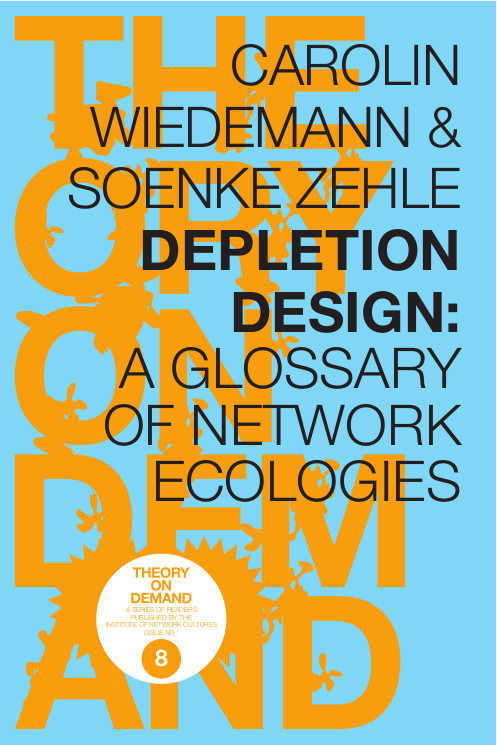Carolin Wiedemann, Soenke Zehle (eds.): Depletion Design: A Glossary of Network Ecologies (2012)
Filed under book | Tags: · algorithm, anonymous, architecture, biopolitics, commons, creative industries, cyborg, design, ecology, hackerspace, media ecology, network ecology, networks, politics, remix, software, spam, technology, theory

“Depletion Design suggests that ideas of exhaustion cut across cultural, environmentalist, and political idioms and offers ways to explore the emergence of new material assemblages. Soenke Zehle and Carolin Wiedemann discuss Depletion Design with Marie-Luise Angerer, Jennifer Gabrys and David M. Berry, inviting tm13 participants into a collaborative reflection on the necessity to understand human beings as one species among others – constituted by interactions of media, organisms, weather patterns, ecosystems, thought patterns, cities, discourses, fashions, populations, brains, markets, dance nights and bacterial exchanges (Angerer); on the material leftovers of electronics as provocations to think through and rework practices of material politics that may be less exploitative within our natural-cultural relationships (Gabrys); and on lines of flight from and through the computational – about expanding them into new ways of living beyond current limitations and towards new means of judgment and politics (Berry).
We, or so we are told, are running out of time, of time to develop alternatives to a new politics of emergency, as constant crisis has exhausted the means of a politics of representation too slow for the state of exception, too ignorant of the distribution of political agency, too focused on the governability of financial architectures. But new forms of individual and collective agency already emerge, as we learn to live, love, work within the horizon of depletion, to ask what it means to sustain ourselves, each other, again. Of these and other knowledges so created, there can no longer be an encyclopedia; a glossary, perhaps.”
Contributors: Marie-Luise Angerer (Cyborg), Franco ‘Bifo’ Berardi (Exhaustion, Soul Work), David M. Berry (On Terminality), Zach Blas (Queer Darkness), Drew S. Burk (Grey Ecology), Gabriella Coleman (Anonymous), Heidi Rae Cooley (Ecologies of Practice), Sebastian Deterding (Playful Technologies, Persuasive Design), Jennifer Gabrys (Natural History, Salvage), Johannes Grenzfurthner & Frank A. Schneider (Hackerspace), Eric Kluitenberg (Sustainable Immobility), Boyan Manchev (Disorganisation, Persistence), Lev Manovich (Software), Sonia Matos (Wicked Problems), Timothy Morton (Ecology without Nature), Jason W. Moore (Crisis), Anna Munster (Digital Embodiment), Eduardo Navas (Remix[ing] Re/Appropriations), Brett Neilson (Fracking), Sebastian Olma (Biopolitics, Creative Industries, Vitalism), Luciana Parisi (Algorithmic Architecture), Jussi Parikka (Dust Matter), Judith Revel (Common), Ned Rossiter (Dirt Research), Sean Smith (Information Bomb), Hito Steyerl (Spam of the Earth)
Publisher Institute of Network Cultures, Amsterdam, Dec 2012
Theory on Demand series, 8
Creative Commons Attribution-NonCommercial-ShareAlike 3.0 Netherlands License
ISBN 9789081857512
via jussiparikka.net
PDF, PDF (updated on 2015-7-9)
Comment (0)Journal of Peer Production, No. 2: Bio/Hardware Hacking (2012)
Filed under journal | Tags: · biology, biotechnology, diy biology, hacker culture, hackerspace, hacking, hardware hacking
During the past two decades, hacking has chiefly been associated with software and computers. This is changing with the surge of synthetic biology, fablabs and hackerspaces, all of which suggests the wider diffusion of hacking practices and hacker politics. Hardware development and biological science are about to be infused with the same kind of contestations and contradictions that already characterize software hacking. This is because hackers are not simply innovating new technology, but are at the same time discovering new ways of engaging with the world. The issue highlights how hacking practices are inscribed in and shaped by the cultural and political contexts in which the hackers find themselves, with implications for the ways hacker politics are framed.
Contributions by Denisa Kera, Maxigas, Sara Tocchetti, Paolo Magaudda, Morgan Meyer, Mitch Altman
Curated by Alessandro Delfanti, Johan Söderberg
Published in July 2012
ISSN 2213-5316
View online (HTML articles)
Comment (0)Magnus Eriksson: Labbet utan egenskaper (2011) [Swedish]
Filed under thesis | Tags: · hacker culture, hackerspace, technology
Uppsatsen undersöker ”hackerspaces” både genom empirisk analys och teorikonstruktion. Hackerspaces beskrivs som ett fenomen som uppstår genom att människor med olika målsättningar och drivkrafter kommer samman genom en gemensam praktik och delande av resurser och kunskap. Därmed är hackerspacet självgenererande snarare än bestämt av en extern logik. Trots denna självgenerering uppstår en specifik praktik och ett visst perspektiv på teknikutveckling då utforskandet inom hackerspaces sker utifrån en specifik teknisk och social sammansättning. Denna praktik benämns spekulativ design vilken består av det konstanta utvecklandet av nya metoder och verktyg för att inkorporera allt fler möjligheter till teknikutveckling inom hackerspacets sociala och materiella sammansättning. Den konstrateras mot andra teorier om teknik och politik som fokuserar på tillgång till teknik, ingrepp i tekniska system och teknik som verktyg för att implementera en politisk målsättning.
Magisteruppsats Sociologiska institutionen, Lunds Universitet, Lund
Handledare: Birgitta Ericson
PDF
View online (HTML)

